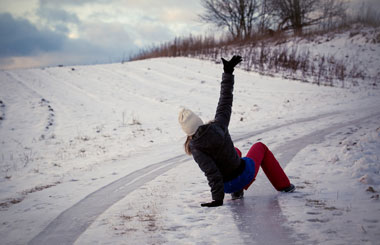Winter is a beautiful time of year, but snow, ice and cold temperatures can create challenging situations for anyone, especially seniors. Older adults can lose body heat faster than when they were young and develop hypothermia, a dangerous problem when the body temperature gets very low. According to a care.com article, for an older person, a body temperature of 95°F or lower can cause serious health problems such as a heart attack, kidney problems, liver damage, and more. Being prepared is important to stay safe. Here are some cold weather safety tips for older adults

- Take measures to avoid slips and falls on ice: Falls and slips are a common problem in winter for both the young and old. But falls can cause major complications in older adults such as hip and wrist fractures, head trauma and major lacerations. Taking the following precautions can reduce the risks of falls:
- Wear shoes with good traction and non-skid soles
- Stay inside until the roads are clear
- To make walking easier, replace a worn cane tip
- Make sure steps and walkways are clear before you walk. Take off shoes soon after you come indoors because snow and ice that remains on the soles can melt and lead to slippery conditions inside.
- Keep warm inside and outside: Too much cold can lead to hypothermia or frostbite. To prevent the body temperature from falling too low, dress in layers and wear warm socks, a heavy coat, a hat, scarf, and gloves, and scarf when you go outdoors. Cover all exposed skin and make sure that your body temperature doesn’t dip below 95 degrees. If it does, get medical assistance immediately. Make sure you eat enough food to maintain your weight. Body fat helps you to stay warm.
- Prevent carbon monoxide poisoning: When using a fireplace, gas heater or other heating source, make sure they are properly vented, and cleaned. If not, they can leak dangerous amounts of carbon monoxide, a deadly gas that you cannot see or smell. Invest in a carbon monoxide detector and if you already have one, check the batteries. The most common symptoms of carbon monoxide poisoning are persistent, severe headaches and dizziness, nausea, vomiting and fatigue. If you think you may be affected, seek medical help immediately.
- Avoid driving: According to an article in healthinaging.org, adults 65 and older are involved in more car accidents per mile driven than those in nearly all other age groups. So it would better if seniors can avoid driving in winter. It can be hazardous for anyone to drive in this season, but older adults face higher risks as their reflexes may not be as quick as they once were. So if you really want to drive take some precautions:
- Before the bad weather hits, winterize your car: check the tires, antifreeze, windshield wipers, etc., and change whatever’s necessary
- Always let someone know where you are going
- Don’t forget your cell phone
- Try avoiding driving on icy roads, and be especially careful while driving on overpasses or bridges. It’s better to take bigger roads as they are often cleared of snow.
- Maintain a balanced diet: As people mostly spend their time in doors during winters, it’s possible that they might eat a lesser variety of foods which might result nutritional deficiencies, especially vitamin D. This could pose serious health problems. So eat healthy. For vitamin D, include milk and grains, and seafood options like tuna and salmon.
If you need help, don’t hesitate to approach a family member, neighbor or friends. Wintertime certainly poses challenges for seniors, but with a bit of planning and awareness, you can stay healthy and experience the joys of the season.